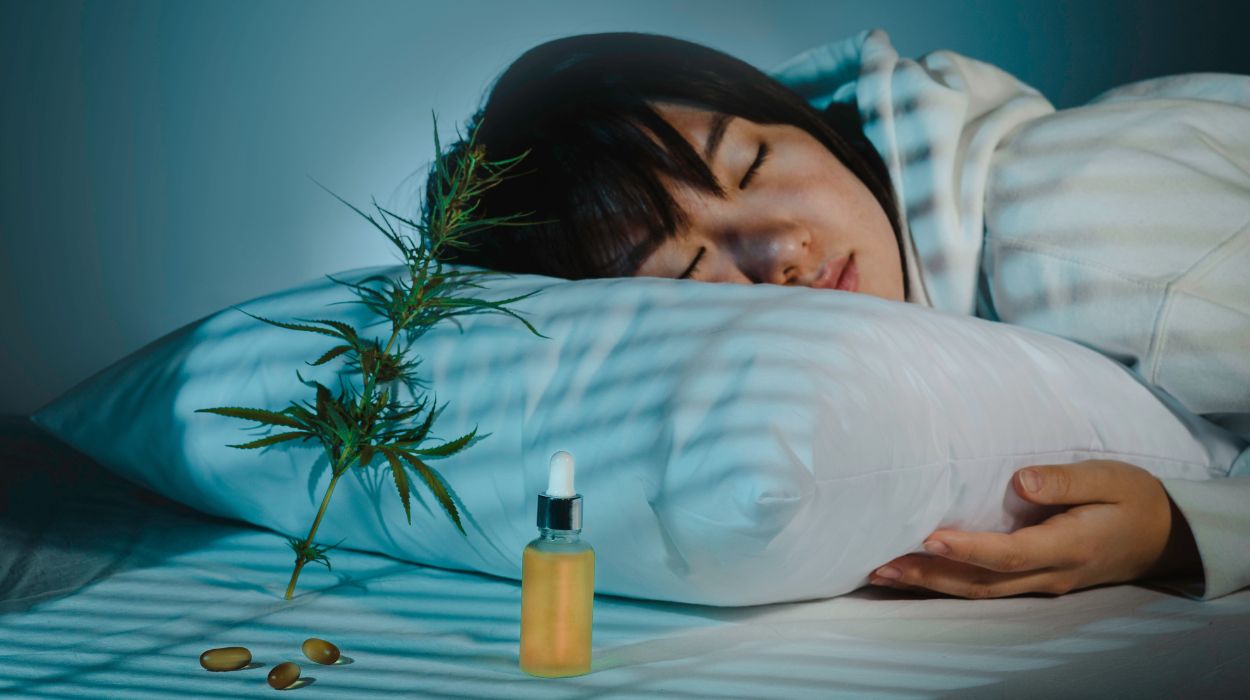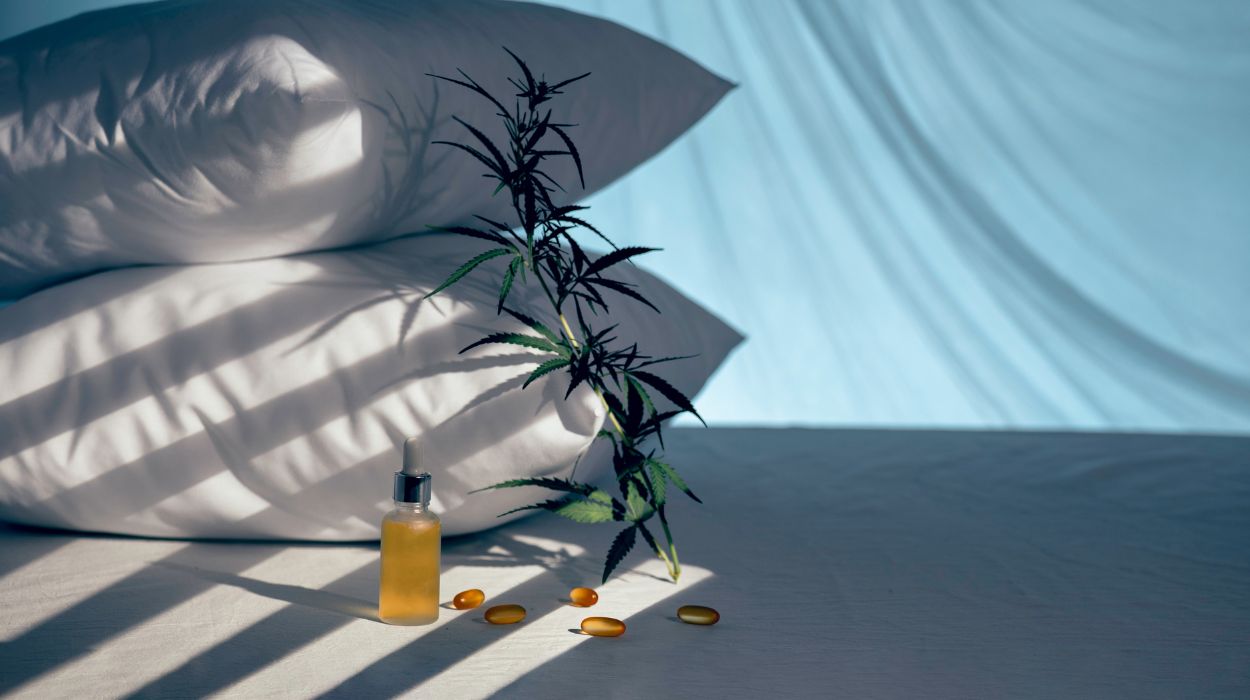 Expert's opinion
Expert's opinion
Expert's opinion
The article is a subjective view on this topic written by writers specializing in medical writing.
It may reflect on a personal journey surrounding struggles with an illness or medical condition, involve product comparisons, diet considerations, or other health-related opinions.
Although the view is entirely that of the writer, it is based on academic experiences and scientific research they have conducted; it is fact-checked by a team of degreed medical experts, and validated by sources attached to the article.
The numbers in parenthesis (1,2,3) will take you to clickable links to related scientific papers.
When To Take CBD Oil For Sleep 2024? Does CBD Work For Insomnia?
All articles are produced independently. When you click our links for purchasing products, we earn an affiliate commission. Learn more about how we earn revenue by reading our advertise disclaimer.

CBD is already cherished by many as a source of homeopathic pain relief and for reducing anxiety. Its ability to promote better sleep, however, often falls by the wayside. The research suggests that CBD might be just as effective as other traditional sleep aids, natural or prescribed, all without the terrible side effects associated with traditional over-the-counter.
Finding the right CBD dosage for sleep will spell the difference between a peaceful night of rest and grogginess, among other sleep problems. A combination of industry-proven facts and your own research first-hand will help you find the best way for you to stay asleep personally, through whichever sleep disorders you’re dealing with yourself.
All-day use might be effective when treating anxiety disorders specifically, so long as excessive daytime sleepiness does not present itself as one of the side effects of CBD usage.
When To Take CBD For Sleep?
Unlike THC, CBD doesn’t really get you “high”[1]. It’s a slow and subtle effect that takes some time to set in completely, unlike other medications.
For a good night’s sleep, many taking CBD are able to take just one dose about thirty minutes before bedtime. Other trials[2] supported by relevant animal studies actually suggest that small doses throughout the day are just as effective long-term if better sleep is what the patient needs above all else.
Does CBD Oil Help You Sleep?
The consensus on CBD’s true effect on complex, sleep-related behaviors is mixed[3]; more research by the appropriate medical associations and national institutes is required to fully understand how CBD will impact sleep in the general population and what long-term side effects that regular use might leave users vulnerable to.
This critical review report[4] revealed that consumer attitudes toward CBD for insomnia are generally positive for both genders; participants reported that medical marijuana was able to reduce anxiety[5], relieve their problems sleeping, and improve other health conditions associated with the inability to fall asleep.
While colloquial advocacy is certainly not negligible, further research into the negative effects of a pure CBD isolate on the nervous system and third-party testing will be required before the mediating authorities will be able to regulate CBD products for all people who suffer from insomnia.
How To Use CBD Oil For Sleep?

Those interested in how to use CBD oil for sleep will likely have two main questions: How much CBD is necessary for staying asleep, and when is the best time to take CBD when you want to fall asleep faster?
How Many Drops Of Oil Should You Take?
Your ideal CBD dose may depend on many factors. It’s been shown that a single dose[6] taken just before retiring for the evening does not impact one’s cognitive performance or disposition throughout the rest of the following day.
What is one dose of CBD? It differs for all people. Your own body composition and tolerance level might put you in a different dosing category.
Cannabinoid research sets a wide range of acceptable doses to explore; doses as small as 5mg daily all the way to 200mg daily have all been documented as successful and appropriate under varying circumstances.
With this in mind, the question then becomes when to take CBD for sleep. In general, a few drops from a trusted brand before bedtime is usually a manageable dose for most. Experimentation and professional medical advice will keep you in your ideal dosage zone.
Again, the method of application or administration will have a lot to do with how much CBD you should be taking. 10mg topically will feel much different than 10mg taken via a vape pen.
Why Do You Have Insomnia?
There are many things that can prevent you from falling asleep. It can be helpful to consider insomnia in two different ways[7]: primary insomnia, where insomnia itself is the real problem, and secondary insomnia, where the sleep quality is being affected by another, the overarching issue that needs to be addressed.
REM sleep behavior disorder has many possible primary causes: the abuse of a wake-promoting agent such as caffeine or cocaine, a poor sleeping and waking schedule due to work or other irregular activity, anxiety, and hormonal conditions that prevent the body from falling into a natural and restful circadian routine. Secondary causes might include post-traumatic stress disorder, restless leg syndrome, jet lag, and Parkinson’s disease patients.
The classic chicken-and-egg question is whether depression and anxiety cause insomnia or whether insomnia causes depression and anxiety. Research suggests[8] that both of these possibilities might be equally valid, but more research is needed in order to verify this. At any rate, CBD’s ability to reduce anxiety and feelings of depression is undeniable and uncontested.
In short, here are a few possible causes[9] of your insomnia, whether primary or secondary:
- Depression and anxiety
- Post-traumatic stress disorder
- The fallout resulting from some other type of traumatic event, such as the death of a loved one or the loss of a job
- Stress and worry about some problem in one’s life
- Difficulty at work or in a social context
- The abuse of stimulants or other drugs and medication
- A lack of exercise
- Sleep apnea
- Jet lag
- Hunger and poor nutrition
Your symptoms may be episodic, persistent, or recurrent, depending on how often you find that you have trouble sleeping at night. Some experts also recommend maintaining a sleep diary that documents how difficult it is for you to get to sleep every night, as well as how long you slept, whether or not you woke up too early or too late, and whether or not you dreamt at all while sleeping, as well.
How To Choose the Best CBD Oil For Sleep?
Once you’ve decided to go for it, the question then becomes how to choose CBD oil out of all of the different brands currently available. You have many options when you buy CBD; the quality of the hemp plants, the purity of the CBD, and whether or not you choose full-spectrum oil will all be determining factors.
There are a couple of buzzwords that you’ll want to look out for. Lab testing is definitely one of them, as CBD products are not yet regulated by any mediating authorities in the United States. Many will also likely be interested in CBD derived from organic hemp plants grown domestically, just like with the food that they eat. Low-level THC CBD is also another important consideration for those who would like to minimize the side effects that they experience while taking CBD oil.
CBD oil, CBD tinctures, and CBD vape cartridges are the most common means of drug administration into the endocannabinoid system. There are actually several ways to use CBD medicinally aside from smoking it straight-up.
Some patients use CBD sprays[10], to name one example. Those whose chronic pain causes poor sleep might find that a topical CBD treatment is the most effective way to proceed. CBD oils can also be taken orally as a CBD edible. Sublingual CBD is absorbed directly into the bloodstream.
Potential Risks & Side Effects
Just like with any other type of sleep aid or medication, the safety and side effects of CBD products will always be something to think about for those considering it to improve sleep. While CBD usage is not completely free of adverse effects, it is worth noting that you cannot overdose on any Cannabis sativa constituent.
The general consensus is that the side effects of CBD in the majority of cases will be minimal. Some worry that their body weight might end up ballooning as the munchies set in, but few reports that CBD has caused them to pick up any unusual eating habits.
The Cannabis sativa plant affects all people differently; you really won’t know how it’ll “hit” you until you try it for the first time, from the safety of your own home.
As always, we recommend seeking a physician to provide medical advice on anything that you are not quite sure about. Try it for yourself and see how you feel.
Final Thought
When it comes to helping patients achieve more restful sleep at night, few will disagree with how effective CBD is as a sleep aid. This homeopathic remedy might just be the answer that you’re looking for.
Frequently Asked Questions
One great thing about CBD is how versatile it is. Because it can be used to treat so many accompanying problems like chronic pain, this cure-all can actually be applied to all sleep disorders. Suppose you need help falling asleep or encouraging better sleep habits in a general sense. In that case, clinical data shows a positive correlation between the use of CBD products and a better night’s sleep.
There is no “correct” CBD oil dose. If you’re a brand new user, you should follow your doctor’s recommendation and the instructions provided with the CBD products that you purchase. It might be helpful to start slow and gradually increase your dose as necessary. Listen to your body and adjust your dose accordingly.
While the cannabis plant is notorious for causing feelings of drowsiness, CBD does not get you “high”. If you time your dose appropriately and avoid exceeding your own tolerance levels, this feeling of sleepiness will actually end up being what lulls you to rest after the day has come to a close.
While taking sleeping aids and cannabis products simultaneously and in the appropriate doses probably won’t kill you, the combination is likely not necessary. The side effects of both, including dizziness, difficulty concentrating, and motor incapacitation, may compound upon one another. We recommend choosing one or the other, whichever appears to be most effective under your own circumstances. And, of course, if you’re not sure, you should always ask a doctor for advice before taking action.
+ 10 sources
Health Canal avoids using tertiary references. We have strict sourcing guidelines and rely on peer-reviewed studies, academic researches from medical associations and institutions. To ensure the accuracy of articles in Health Canal, you can read more about the editorial process here
- VanDolah, H., Bauer, B.A. and Mauck, K.F. (2019). Clinicians’ Guide to Cannabidiol and Hemp Oils. Mayo Clinic Proceedings, [online] 94(9), pp.1840–1851. doi:https://doi.org/10.1016/j.mayocp.2019.01.003.
- Shannon, S. and Opila-Lehman, J. (2016). Effectiveness of Cannabidiol Oil for Pediatric Anxiety and Insomnia as Part of Posttraumatic Stress Disorder: A Case Report. The Permanente Journal, [online] 20(4). doi:https://doi.org/10.7812/tpp/16-005.
- Babson, K.A., Sottile, J. and Morabito, D.M. (2017). Cannabis, Cannabinoids, and Sleep: a Review of the Literature. Current Psychiatry Reports, [online] 19(4). doi:https://doi.org/10.1007/s11920-017-0775-9.
- Kayani, S. (2018). ‘Investigating views and opinions of using Cannabidiol (CBD) to relieve stress and insomnia.’ [online] ResearchGate. Available at: https://www.researchgate.net/publication/331409104_Investigating_views_and_opinions_of_using_Cannabidiol_CBD_to_relieve_stress_and_insomnia.
- Hsiao, Y.-T., Yi, P.-L., Li, C.-L. and Chang, F.-C. (2012). Effect of cannabidiol on sleep disruption induced by the repeated combination tests consisting of open field and elevated plus-maze in rats. Neuropharmacology, [online] 62(1), pp.373–384. doi:https://doi.org/10.1016/j.neuropharm.2011.08.013.
- Suraev, A., Grunstein, R.R., Marshall, N.S., D’Rozario, A.L., Gordon, C.J., Bartlett, D.J., Wong, K., Yee, B.J., Vandrey, R.G., Irwin, C., Arnold, J.C., McGregor, I.S. and Hoyos, C.M. (2020). Cannabidiol (CBD) and Δ9-tetrahydrocannabinol (THC) for chronic insomnia disorder (‘CANSLEEP’ trial): protocol for a randomised, placebo-controlled, double-blinded, proof-of-concept trial. BMJ Open, [online] 10(5), pp.e034421–e034421. doi:https://doi.org/10.1136/bmjopen-2019-034421.
- Google Books. (2023). Sleep. [online] Available at: https://books.google.com.vn/books?hl=en&lr=&id=aNhAk4knmukC&oi=fnd&pg=PA99&dq=causes+of+insomnia&ots=fUVeSh_cnH&sig=3oI0UDipQTApTAeAj7Qg5dY_LkQ&redir_esc=y#v=onepage&q=causes%20of%20insomnia&f=false [Accessed 20 Aug. 2023].
- Arroll, B., Fernando, A., Falloon, K., Felicity Goodyear-Smith, Samaranayake, C.B. and Warman, G.R. (2012). Prevalence of causes of insomnia in primary care: a cross-sectional study. British Journal of General Practice, [online] 62(595), pp.e99–e103. doi:https://doi.org/10.3399/bjgp12x625157.
- Sahoo Saddichha (2010). Diagnosis and treatment of chronic insomnia. Annals of Indian Academy of Neurology, [online] 13(2), pp.94–94. doi:https://doi.org/10.4103/0972-2327.64628.
- Johnson, J., Lossignol, D., Burnell-Nugent, M. and Fallon, M. (2013). An Open-Label Extension Study to Investigate the Long-Term Safety and Tolerability of THC/CBD Oromucosal Spray and Oromucosal THC Spray in Patients With Terminal Cancer-Related Pain Refractory to Strong Opioid Analgesics. Journal of Pain and Symptom Management, [online] 46(2), pp.207–218. doi:https://doi.org/10.1016/j.jpainsymman.2012.07.014.



